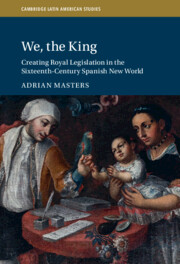Book contents
- We, the King
- Cambridge Latin American Studies
- We, the King
- Copyright page
- Dedication
- Contents
- Figures
- Tables
- Acknowledgments
- Prelude: A Peruvian Mestizo at the Spanish Court
- Introduction
- 1 Paper Ceremonies for a Global Empire
- 2 The Cocreation of the Imperial Logistics Network
- 3 Distant Kings, Powerful Women, Prudent Ministers
- 4 Lawmaking in a Portable Council
- 5 “Bring the Papers”
- 6 Creating the Royal Decree
- Pedro Rengifo’s Epilogue
- Conclusions
- Glossary
- Bibliography
- Index
- Other Books in the Series (continued from page ii)
Introduction
The Collective Making of an Empire
Published online by Cambridge University Press: 02 March 2023
- We, the King
- Cambridge Latin American Studies
- We, the King
- Copyright page
- Dedication
- Contents
- Figures
- Tables
- Acknowledgments
- Prelude: A Peruvian Mestizo at the Spanish Court
- Introduction
- 1 Paper Ceremonies for a Global Empire
- 2 The Cocreation of the Imperial Logistics Network
- 3 Distant Kings, Powerful Women, Prudent Ministers
- 4 Lawmaking in a Portable Council
- 5 “Bring the Papers”
- 6 Creating the Royal Decree
- Pedro Rengifo’s Epilogue
- Conclusions
- Glossary
- Bibliography
- Index
- Other Books in the Series (continued from page ii)
Summary
Beginning with the mysterious problem of the so-called “caste system,” this introduction questions the ubiquitous scholarly understanding of the monarchy as a cabal of lawmakers determined to legislate every detail of vassals’ lives. It introduces a very different perspective – namely, that subjects submitting gobierno or administrative-legislative petitions not only prompted the vast majority of the empire’s dizzying thousands of royal decrees – including those concerning novel categories of human difference. It explains how both liberal-era and Habsburg mythologies of Spanish imperial rule envisioned the king as the primary author of these texts, and proposes a labor-oriented, Actor-Network Theory-inspired alternative explanation. It introduces the petition-and-response system, explaining that early modern participants sought intimate lord–ruler dialogue, in which vassals and lords endowed their writings with voluntad or volition, in order to save the consciences of all involved. It also argues that in order for this communication to thrive, a number of legal fictions – including the transfer of voluntad across the globe – was necessary. Also lurking in the distance was violence against the saboteurs of this ruler–ruled dialogue. Lastly, this segment introduces the source material and book structure.
- Type
- Chapter
- Information
- We, the KingCreating Royal Legislation in the Sixteenth-Century Spanish New World, pp. 6 - 46Publisher: Cambridge University PressPrint publication year: 2023

